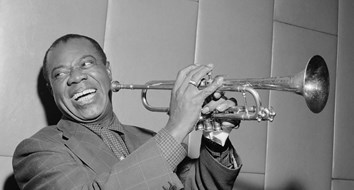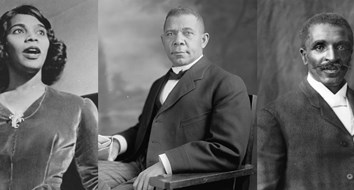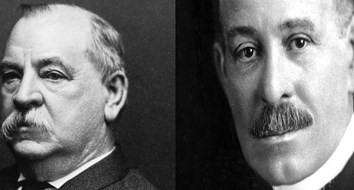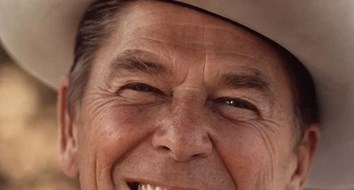Download:
“Democracy,” H. L. Mencken once said, “is the theory that the common people know what they want, and deserve to get it good and hard.” He also famously defined an election as “an advance auction sale of stolen goods.”
Mencken was not opposed to democracy. He simply possessed a more sobering view of its limitations than today’s conventional wisdom.
Indeed, democracy may be the world’s single most oversold concept of political governance. Commonly yet erroneously romanticized, it is assumed in most circles to ensure far more than it possibly can. The Norman Rockwell portrait of engaged, informed citizens contending freely on behalf of the common good is the utopian ideal that obscures the messy details of reality.
Just how oversold democracy is came home to me recently as I listened to a group of college students debating farm subsidies. Advised that experience and economics underscore the folly of subsidies, the student consensus was nonetheless in support of “helping farmers.” Why? Because that’s apparently what the people wanted when they voted for the congressmen who gave us the handouts. To those students and a disturbing number of other citizens these days, the veneer of “democracy” somehow covers up a multitude of sins. It may even sanctify them. We need another dose of Mencken-esque reality—and that starts with a clearer view of what this thing is that enraptures so many.
Monarchy is easy to define. If you’ve got a king, you’ve got one. Military dictatorship is also stark in its manifestation. If one guy wears a uniform, has all the tanks, and tells everybody else what to do, you’ve got one of those. But what exactly is democracy?
Pure, undiluted democracy is unshackled majority rule. Everybody votes on everything, and 50 percent plus one decides every “public” issue—and inevitably, a whole lot of what ought to be private ones too. Perhaps ancient Athens for a brief time came closest to this, but no society of any size and complexity can practice this form of governance for long. For starters, it’s unwieldy and unworkable, endlessly contentious, and disrespectful of certain inalienable rights of individuals who may find themselves in the minority.
People like the sound of “democracy” because it implies that all of us have equal say in our government and that a simple majority is somehow inherently fair and smart in deciding all or virtually all issues. On closer examination it should become apparent that subjecting every decision of governance to a vote of the people is utterly impossible. Many decisions have to be made quickly; many decisions require knowledge that few people possess or have the time to become expert on; and many decisions don’t belong in the hands of any government at all. A pure democracy, even if possible, would quickly degenerate into the proverbial two wolves and a sheep voting on what to have for lunch.
Suppose someone says, “I just don’t like people with boats and jewelry. I think we should confiscate their property. Let’s have a vote on that.” A democratic purist would have to reply, “All in favor say aye.” A person interested in securing individual rights would have to say, “That’s not a proper function of government, and even if 99 percent of the citizens vote for it, it’s still wrong. There’s nothing about mob rule that makes such a decision legitimate.”
In common parlance, “democracy” has been stretched to mean little more than responsive government. Because of elections, government officials cannot behave in a vacuum. That fact is laudable, but it hardly makes a “democratic” government heavenly. In his penetrating book, Capitalism, Democracy, and Ralph’s Pretty Good Grocery, Ohio State University professor John Mueller writes that democracy “has been characterized by a great deal of unsightly and factionalized squabbling by self-interested, shortsighted people and groups, and its policy outcomes have often been the result of a notably unequal contest over who could most adroitly pressure and manipulate the system. Even more distressingly, the citizenry seems disinclined to display anything remotely resembling the deliberative qualities many theorists have been inclined to see as a central requirement for the system to work properly.”
Irrespective of presidential candidates’ singing interminable paeans to “our democracy,” America is thankfully not one and never has been. Our Founders established a republic, and a republican form of government modifies pure democracy considerably. It provides a mechanism by which almost anyone can have some say in some matters of government. We can run for office. We can support candidates and causes of our choosing. We can speak out in public forums. And, indeed, a few matters are actually decided by majority vote. But a constitutional republic founded on principles that are more important than voting—like individual rights—will put strong limits on all this. In its Bill of Rights, our Constitution clearly states, “Congress shall make no law. . . .” It does not say, “Congress can pass anything it wants so long as 50 percent plus one support it.”
Ballots over Bullets
Those democratic elements of our republic should be given their due. Elections are a political safety valve for dissident views, because ballots not bullets resolve disputes. But the saving grace of democracy is not that it ensures either good or limited government; it is nothing more than that the system allows for political change without violence—whether the change a majority favors is right or wrong, good or evil.
We should be thankful America’s Founders did not erect a monarchy or a dictatorship, but we should have no illusions about the harm a responsive government, whatever you want to call it, can still do. Even the best and most responsive of governments, we should never forget, still rests on the legal use of force—an inescapable fact that requires not blind and fawning reverence but brave and determined vigilance. That calls for sober people who understand the nature of government and the importance of liberty.





